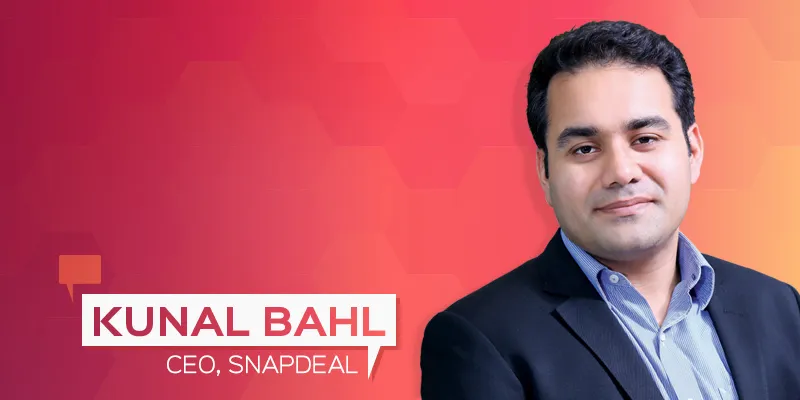‘I will be doing this for the next 25 years,’ says Kunal Bahl, CEO, Snapdeal
Snapdeal on Tuesday announced the launch of a semi-closed Freecharge wallet. Snapdeal had acquired Freecharge for about $400 million earlier this year. The company has kept itself a steep target of making the Freecharge wallet the most used one in the next six months. The company believes Snapdeal’s high gross merchandise value, which has touched a run rate of $4 billion, combined with Freecharge’s high volume of transactions will make this happen. Snapdeal is also partnering with Fino, which recently bagged the payments bank license, to offer wallets to rural India. Kunal Bahl, Co-Founder and CEO of Snapdeal, spoke to YourStory on the impact the wallet will create and how he continues to focus on building an e-commerce ecosystem. Edited excerpts:

YS: What are the three biggest areas of impact you see with Freecharge wallet?
Kunal: One of the most important is that it makes it more convenient for consumers to pay. There is no two-factor authentication every time they need to make a payment, not credit card payment failures. Second, for consumers to get refunds it used to take time although we launched one-hour refunds last week. Now they can get it in one place and use it for multiple merchants. Third, we already have RupeePower, which is our consumer financing business. Through that we will be able to give consumers loans as well. Sometimes consumers need just Rs 5,000 loan and now we can give that too. The loan will come to the wallet.
YS: What are the other use cases?
Kunal: There are many use cases. We have a list of 25 projects. Every week you will hear something from us.
YS: You are partnering with Fino, which has recently got the payment bank license. What will be the scope of the partnership?
Kunal: Fino is going to cater to the unbanked. We are focusing on building a seamless digital payment system where transacting is very easy and on the other hand we are connecting many merchants. For someone in rural India, when they open a bank account with Fino, they get Freecharge wallet along with it. That is the scope of the partnership. We don't want to go build the infrastructure of Rural India. We don't believe we need to be in every business out there. We believe in partnerships. That is how we built Snapdeal and the same thing we will do in Freecharge.
YS: This is a semi-closed wallet. Will you partner with other commerce players? Will we see Freecharge wallet on Uber?
Kunal: Any merchant. We are opening it up to any merchant, anyone. We will not say no. It will be a really bad outcome if a year later majority of the transactions are still coming from Freecharge and Snapdeal.
YS: You have Snapdeal, Freecharge, Shopo, and many other initiatives. So what’s next?
Kunal: I have a lot of work! But seriously, the face of our company has changed during the last six months. What I started talking about six to seven months ago about building an ecosystem rather than a monolithic platform. We are really holding true to it. We are building an ecosystem through investments like we did with GoJavas or like Shopo for micro-merchants who did not want to register a company. Same with Freecharge. Payments are the center of our ecosystem. We acquired Freecharge and turned it into a payments business. I am very excited that our payments ecosystem is coming together very well and we have a lot of irons in the fire for the future.
YS: So what are the gaps that are left?
Kunal: There are many gaps. Ten years from now India’s consumption GDP will be $2.5 trillion. Of this 10% will be online. That is $250 billion. All of that $250 billion is fair game to go after for us. We will not go after all of it in one go. We will go after this thoughtfully. We have time. I am going to be doing this for the next 25.







